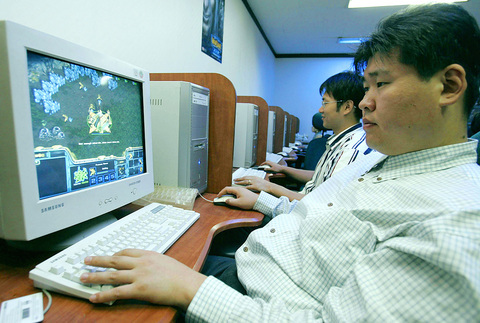Keyboard and mouse in hand, he battled until nearly his last breath.
The death of Lee, a 28-year-old man identified only by his last name who passed away early last month after nearly 50 straight hours of playing online computer games, has South Korea concerned about the health of the millions of gamers in the world's most wired country.
Many of South Korea's 17 million gamers regularly stroll into Internet cafes, the 1,000 won-per-hour (US$1) hangout popular among young South Koreans, and camp out in front of monitors to play for hours -- and even sometimes days or longer.

PHOTO: AP
"I've seen people who play games for months, just briefly going home for a change of clothing, taking care of all their eating and sleeping here," said Jun Mung-gyu, 27, who runs an Internet cafe in southeastern Seoul.
More than 70 percent of South Korea's population of 48 million uses the Internet, and the country has the highest per-capita rate of broadband connections in the world. With all that access has come the rising problem of Internet addiction.
The number of counseling sessions for game addiction quadrupled last year from the previous year, a government agency said last week. There were 8,978 cases of counseling for game addition last year, compared with 2,243 cases in 2003, according to data released by the Korea Agency for Digital Opportunity and Promotion.
This year, there have already been 7,649 counseling sessions in the first seven months.
"The rise is mostly due to increased awareness of game addiction," said agency official Jang Woo-min. "More people are becoming aware of the importance of healthy and productive usage of computers."
Gamers camped out at Internet cafes typically live on instant cup noodles and cigarettes, barely sleeping and seldom washing. Lee wasn't the first to die of such causes in this game-crazed nation: In 2002, a man expired in Kwangju after 86 hours of marathon gaming, among others.
Lee collapsed Aug. 5 in Daegu after having eaten minimally and not sleeping, and died a few hours after being transported to a hospital. Doctors presume Lee died of heart failure, although no autopsy was performed.
Internet cafe proprietor Jun himself isn't far removed from his game-addict days. Just a year ago, Jun found himself playing up to 15 hours of online role-playing games a day, which gave him constant headaches and cramps in his neck and shoulders.
"You have no life, you only focus on gaming, putting off all things like getting a haircut," recalled Jun, who said he felt obligated to return to the games every morning when he woke up.
Jun eventually was able to pull himself out of the addiction a few months ago as work began to occupy more of his time. That wasn't the case for the deceased gamer Lee, whose addiction led him to often miss work and got him fired from his job.
Physicians working with professional e-sports teams recommend gamers rest 10 minutes with their eyes closed after every five matches, and never play in the same posture for more than two hours.

Intel Corp chief executive officer Lip-Bu Tan (陳立武) is expected to meet with Taiwanese suppliers next month in conjunction with the opening of the Computex Taipei trade show, supply chain sources said on Monday. The visit, the first for Tan to Taiwan since assuming his new post last month, would be aimed at enhancing Intel’s ties with suppliers in Taiwan as he attempts to help turn around the struggling US chipmaker, the sources said. Tan is to hold a banquet to celebrate Intel’s 40-year presence in Taiwan before Computex opens on May 20 and invite dozens of Taiwanese suppliers to exchange views

Application-specific integrated circuit designer Faraday Technology Corp (智原) yesterday said that although revenue this quarter would decline 30 percent from last quarter, it retained its full-year forecast of revenue growth of 100 percent. The company attributed the quarterly drop to a slowdown in customers’ production of chips using Faraday’s advanced packaging technology. The company is still confident about its revenue growth this year, given its strong “design-win” — or the projects it won to help customers design their chips, Faraday president Steve Wang (王國雍) told an online earnings conference. “The design-win this year is better than we expected. We believe we will win

Chizuko Kimura has become the first female sushi chef in the world to win a Michelin star, fulfilling a promise she made to her dying husband to continue his legacy. The 54-year-old Japanese chef regained the Michelin star her late husband, Shunei Kimura, won three years ago for their Sushi Shunei restaurant in Paris. For Shunei Kimura, the star was a dream come true. However, the joy was short-lived. He died from cancer just three months later in June 2022. He was 65. The following year, the restaurant in the heart of Montmartre lost its star rating. Chizuko Kimura insisted that the new star is still down

While China’s leaders use their economic and political might to fight US President Donald Trump’s trade war “to the end,” its army of social media soldiers are embarking on a more humorous campaign online. Trump’s tariff blitz has seen Washington and Beijing impose eye-watering duties on imports from the other, fanning a standoff between the economic superpowers that has sparked global recession fears and sent markets into a tailspin. Trump says his policy is a response to years of being “ripped off” by other countries and aims to bring manufacturing to the US, forcing companies to employ US workers. However, China’s online warriors